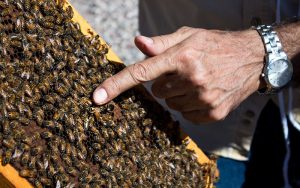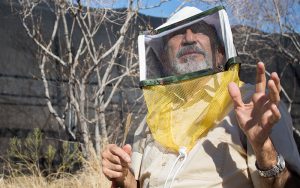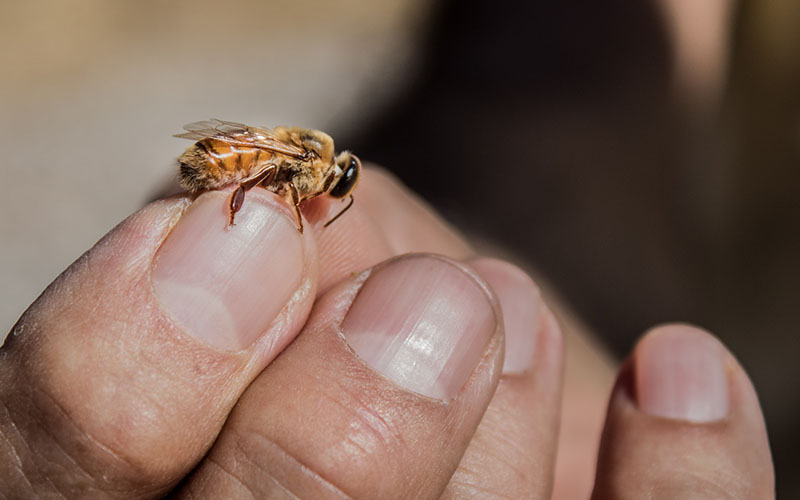PHOENIX – Consumer advocacy groups across the country are fighting to ban certain pesticides they say are rapidly killing the nation’s honeybee population.
The U.S. Public Interest Research Group is among the organizations lobbying the Environmental Protection Agency to ban the pesticides, known as neonicotinoids, which are commonly used on crops. When people treat seeds with neonicotinoids, the chemicals end up in the pollen and flowers of the crops, which the bees interact with when pollinating.

Osman Kaftanoglu, the project manager at Arizona State University’s School of Life Sciences bee lab in Tempe, points out the queen bee in the hive. European queen bees are marked. (Photo by Melina Zuniga/Cronkite News)
From April 2016 to April 2017, beekeepers across the U.S. lost a third of their honeybee colonies, according to a University of Maryland study. Honeybees, which were brought to the U.S. by European settlers, pollinate at least 90 percent of all commercially grown crops in North America. Some crops, such as almonds, are pollinated by honeybees alone.
The Arizona chapter of PIRG is raising awareness and building support in the state. They’re exploring options to limit the use of the pesticides, including introducing private sale bans, prohibiting use on state buildings or asking universities to stop using them. Their website contains a link to “Tell Governor Ducey” to ban these pesticides, with an information form and prewritten message that users can fill out.
U.S. PIRG has said that while it supports complete bans, it is only advocating for ban of private sales for now.
“The ban that we’re calling for would not affect agriculture,” said Kara Cook-Schultz, U.S. PIRG’s toxics program director. “We’re not asking farmers to make any change here, we’re asking people who garden to make a change, and we’re asking public spaces to make a change.”
Chelsea McGuire, the Arizona Farm Bureau’s director of government relations, said her group would oppose anything that would limit the ability of farmers to utilize the tools at their disposal.
That includes a partial ban, viewing it as a slippery slope to an agricultural ban.
“We definitely understand the value in kind of scaling back that ban and still allowing this to be a tool that farmers and agriculture as an industry can use,” McGuire said. “Consumers should have access to the same tools that they need to keep their homes and gardens safe as long as they’re using those tools effectively and responsibly.”
McGuire said in an email that farmers use neonicotinoids in pest management and use them “responsibly and carefully, so as to protect the pollinator populations that are required to pollinate a farmer’s crops.”
The Arizona agricultural industry has a $23.3 billion economic impact in the state, according to the Arizona Department of Agriculture.
She said the farm bureau would be “more behind” something like the law in Minnesota that requires farmers to show a need for use.
“We’re always willing to work with our lawmakers and work with our policymakers to the extent that we can, but we want to make sure that the end product is something that’s workable for agriculture,” she said.
McGuire said causes of the bee population decline are too multifaceted to be blamed exclusively on neonicotinoids.

Osman Kaftanoglu, the project manager at Arizona State University’s School of Life Sciences bee lab in Tempe, describes the negative impact an Africanized bee could cause to a European hive. (Photo by Melina Zuniga/Cronkite News)
“There’s no scientific evidence that is credible and reliable that shows a ban on neonicotinoids just blanketed in general is actually going to solve the pollinator population,” McGuire said.
McGuire cited climate change and the varroa mite, a parasitic mite that affects bees, as contributing factors in the declining population.
The U.S. PIRG agreed that a warming planet and varroa mites are contributing factors, but contends neonicotinoids are the main problem.
“What we have said about these bee-killing pesticides is that they are creating a tipping point for the bees,” Cook-Schultz said. “If a bee colony is already under stress from the bee-killing pesticides … the beehive is more likely to be attacked by these mites.”
The European Union has banned several neonicotinoids. The U.S. PIRG shifted its focus from the EPA to the state level in hopes of pressuring state legislatures to ban or better regulate the pesticide. The decline of honeybee populations has gained national buzz thanks to pop culture moments like the “Bee Movie” and social media memes. The national discussion presents an opportunity for advocacy groups to capitalize on the attention bees are receiving.
Cook-Schultz said the group’s work at the state level has led to quicker success than many had expected.
“Maryland and Connecticut, for example, have banned the use of neonicotinoids for private sale, so that’s the kind of ban we’re asking other states to follow,” Cook-Schultz said. Those bans took only eight months to enact.
Maryland’s law, which took effect earlier this year, bans neonicotinoids for everyone except certified applicators, veterinarians and farmers.
The U.S. Fish and Wildlife Service committed in 2014 to phasing out the use of neonicotinoids, citing the impact to on non-targeted insects, including bees, which can adversely impact the wildlife population.
Cronkite News reporter Tim Johns contributed to this article.

Osman Kaftanoglu, the project manager at Arizona State University’s School of Life Sciences bee lab in Tempe, spots a male drone in the honeycomb and holds it between his fingers. (Photo by Melina Zuniga/Cronkite News)
Have a story idea? Email us at cronkitenews@asu.edu.